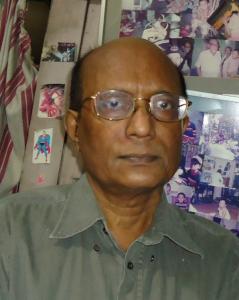Marking May as the “Short Story Month,” Words Without Borders highlights some of its stellar past publications, the Dagestani-Russian novelist Alisa Ganieva’s bitterly comic “A Village Feast” among them.

Three Questions for Feroz Ahmed-ud-din
(Bangladesh; IWP 1976)
Feroz Ahmed-ud-din (IWP ’76, Bangladesh). Poet, translator, freelance writer, airliner. Undergraduate and graduate degree in English and American literature, U of Dhaka. Book of poems This Handful of Dust (1975, Calcutta). Recipient of All Nations Poetry Award (Triton College, IL). Work included in anthologies Disenchantment (1985) and Golden Treasury of Writers' Workshop Poetry (2008). Translation W.H.Aziz‘ Urdu ghazals, collected as Apna Khayal (2002). Presently working on a volume of translation of Sufi poetry.
I. Literary/personal
How present is writing in your daily life?
It is very much present in my daily life. It had always been there. While in a 9 to 5 non-literary job last few years, writing poetry had become something personal. Something that lacked the writer-reader bond, as only a few poems were published. My writing and translating ghazals continued even then. Recently I have finished translating a second set of around sixty Urdu ghazals of the contemporary Sufi poet Waliul Hamid Aziz. Some time back a first set of my translations of his ghazals, Apna Khayal (Own Thoughts), were published in a bi-lingual edition.
What are the books on your work desk and on your nightstand at the moment?
On my work desk at this moment is a book on airline passenger tariff…I am supposed to write a compact, easy-to-understand version for some young trainee airliners. On my desk I also have my favorite poet, William Stafford—the Harper & Row edition of his Stories That Could Be True: New and Collected Poems. And the April 2012 issue of Poetry, from Chicago. On my nightstand is P.Lal’s Golden Treasury of Writers' Workshop Poetry, and Idris Shah’s Oxford edition of Way of the Sufi.
What marks has your time in the IWP, and in the US, left ? Do you follow contemporary American literature, and culture?
I feel that I actually started my life from the IWP. The impact of those few months at the IWP and the US, in 1976, was immense.In my case, the American influence started more at home than when I was actually in the US. My father was a chief of police, posted in various districts. The children changed schools but stuck to English as the medium of instruction. We grew up with Tom Sawyer and Huckleberry Finn, with Classic and Dell Comics, with Uncle Tom’s Cabin and Shane, The Hound Dog Man and The Virginian. I grew up with David Janssen pursuing the one-armed man on Greyhound buses. When I boarded my first Greyhound ride from Iowa City to Quincy, Illinois, I felt that I had been riding this bus even as a kid. The total experience of the IWP is unforgettable. I met talented writers from all over the world. Read their writings, discussed their feelings, translated their works. The local writers and students that I used to meet regularly in Daniel Weissbort’s translation workshop every week, and that was an exciting experience. Met writers like Stephen Spender and Robert Bly, but Paul Engle remained my writer of appreciation, as I read his writings and discussed poetry with him almost every week.
The travel grant from the State Department took me to many cities. Met writers in San Francisco, in Washington DC, in Los Angeles, at Niagara Falls. I could see the difference in their outlook from one city to another. Spent Thanksgiving holiday with an Iowa farm family. Saw the real American rural life. These IWP encounters taught me respect for people irrespective of their color or background.
I do follow the contemporary American literature and culture. The source of contemporary American literature culture for me is the internet, sometimes a few books. Satellite TV programs bring the contemporary US closer. Other sources in these parts of the world are the timeless Time and Newsweek magazines.
II. Literary/general
What writers, or works, in your regional sphere have in your opinion been neglected, and deserve more attention?
The so-called minorities in this region. The hill tribes in the south-east of my country speak around twelve different languages/dialects. Some live in the oral tradition, without the written alphabet. Some young writers are coming up, but on a very small scale. They deserve more attention.
Are there literary journals or on-line publications you keep up with ?
My favorite is Harriet Monroe’s Poetry magazine. The Chicago Poetry Foundation’s publications and event news, among others.
In what ways has your work been affected— in style, in themes, in responses--by global connectivity ?
For me global connectivity has been a source of new and current ideas perused in global poetry writing. When a person writes, he has a specific audience/readership in his mind. Global connectivity broadens the imagined readership and hence the writing style, and the theme is affected to some extent.
III. Broad
What pressing political or social issues in your quadrant of the world should be given more global attention?
The rise of poverty levels. The lack of employment opportunities. Part of the land of my country is going under water very soon.
What role ought the state play with respect to the arts, and culture in general?
More state support of arts and culture is needed, without any unnecessary state control. Arts and culture should be allowed to flourish unhindered.
What is your utopia?
Live life sans borders. It may not be possible to jump barbed wires across borders, but one can read what is written from the other side. One can write of life on his side, and then there would be no barbed wires left around us any more.
Find Us Online